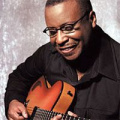Artists
 Phat Phunktion
Phat Phunktion
Phat Phunktion, a group of University of Wisconsin-Madison music students formed in 1996, have built a loyal following of listeners throughout the United States and around the world. A nine-piece tour de force that combines the polish of top 40 with the smooth feeling of 60’s soul and the raw groove of 70’s funk, Phat Phunktion is today one of the most talked about bands in the Midwest.
 Philadelphia Experiment
Philadelphia Experiment
A one-off studio jam featuring native Philadelphia musicians Ahmir Thompson (the Roots, Erykah Badu, Macy Gray, Musiq Soulchild), Christian McBride (McCoy Tyner, Kathleen Battle, Benny Golson, Benny Green, Ray Brown), and Uri Caine (Mickey Roker, Robert "Bootsie" Barnes, Don Byron), the Philadelphia Experiment players met for three breezy September days in 2000 at the Roots' studio space.
 Pizzicato Five
Pizzicato Five
Godfathers of the Shibuya-kei scene, Tokyo kitsch-pop deconstructionists Pizzicato Five originally began taking shape as far back as 1979, when university students Yasuharu Konishi and Keitaro Takanami first met at a local music society meeting.
 Portishead
Portishead
Portishead may not have invented trip-hop, but they were among the first to popularize it, particularly in America. Taking their cue from the slow, elastic beats that dominated Massive Attack's Blue Lines and adding elements of cool jazz, acid house, and soundtrack music, Portishead created an atmospheric, alluringly dark sound.
 Quincy Jones
Quincy Jones
In a career spanning over seven decades, Quincy Jones has earned his reputation as a renaissance man of American music. Since entering the industry as an arranger in the early 1950s, he has distinguished himself as a bandleader, solo artist, sideman, songwriter, producer, film composer, and record label executive.
 Red Snapper
Red Snapper
Red Snapper are notable for a pioneering and evolving synthesis of acoustic and electronic sounds that has drawn from avant-garde jazz, funk, dub, post-punk, and hip-hop.
 Richard Bona
Richard Bona
Jazz bassist Richard Bona was born and raised in the West African nation of Cameroon, going on to session dates with Joe Zawinul, Regina Carter, and Bob James as well as a two-year stint as musical director for the great Harry Belafonte.
 Ronny Jordan
Ronny Jordan
One of the acid jazz movement's most prominent guitarists, London-born Ronny Jordan was widely credited with returning the instrument to its rightful place as a major force in modern-day jazz.